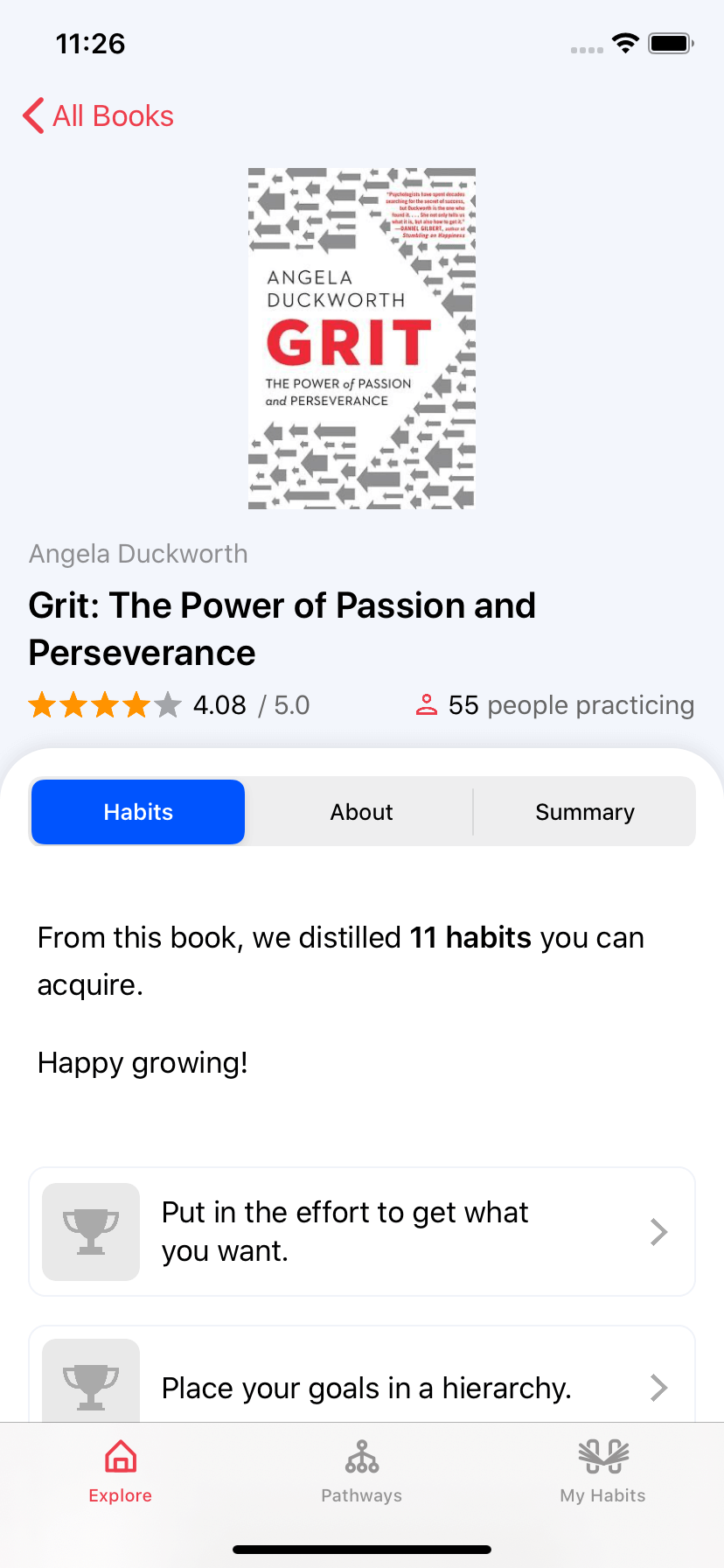
Grit: The Power of Passion and Perseverance
by Angela DuckworthGrit is a book about the power of passion and perseverance. No matter who you are—an athlete, a businessman, a student, a parent—this book has advice for you. It doesn’t matter whether you have the raw talent to succeed in your chosen field or not; all that matters is the amount of your effort and how you put it in.
We have drawn on the knowledge and advice given in this book and compiled a list of actions for you. If you want to achieve success, learn more about yourself, or hone your parenting skills, these actions will be incredibly useful.
Showing Up
The West Point admissions process is highly competitive. It requires top scores on standardized tests, exceptional high school grades, and a nomination from a prominent government official. Only 1,200 out of 14,000 applicants are accepted into the prestigious military academy. But despite the rigorous selection process, many cadets still fall by the wayside, with a significant number dropping out before graduation, even during their first summer of training.
To reach your goals, it's important to show up and put in the effort, but it's equally important to have a "never give up" attitude. At West Point, for instance, being able to make it through the challenging Beast training program depends more on a "never give up" mentality than on raw talent.
But it's not just West Point. This "never give up" mentality, or "grit," is one of the most important characteristics that high-achievers in various fields possess. Grit is a combination of passion and perseverance, which means being resilient and hardworking, and having a deep understanding and passion for your goals. No matter what obstacles come your way, those with grit won't back down.
By developing grit, you not only become stronger; but also increase your chances of success.
Actions to take
Grit: Working On Something You Care About
As discussed, grit is a combination of passion and perseverance in pursuing your goals. It involves staying committed to something you are deeply passionate about, working towards developing your skills, solving complex problems, and delivering valuable results over time.
The grit score is a reflection of how one sees himself. It can be different at different points in life. Grit has two components: passion and perseverance. Perseverance scores are usually higher than passion scores.
Often, we think of passion merely as intense emotions. But high achievers think of it differently. For them, it involves a sustained commitment to one's goals, not just a fleeting enthusiasm.
In a study of 301 highly accomplished historical figures conducted by Catharine Cox, it was found that intelligence alone had a limited correlation with eminence, while the persistence of motive, which includes elements of grit, was a much stronger predictor of success. This means that a combination of high, but not necessarily the highest, intelligence and the greatest degree of persistence would lead to greater eminence than the highest degree of intelligence with somewhat less persistence.
Actions to take
Cultivating Grit
Grit is a combination of nature and nurture. Like height, grit can also be influenced by both genetic disposition and life experiences.
The maturity principle suggests that individuals learn from their experiences and adapt over time, leading to increased grit. This can be seen in the Flynn effect and its reverse, where individuals become grittier with age and experience as they come to understand the importance of hard work and passion in achieving excellence.
In general, grit scores tend to be higher in older adults and lower in individuals in their twenties, reflecting the impact of life experience on grit.
Actions to take
Unlocking Your Full Potential Through Your Interests
Interest is the fuel that drives us to do the things we want to do. It is the spark that ignites our passion and motivates us to take action. It is the energy that keeps us going even when things get tough. And most importantly, it is the key to unlocking our full potential and achieving our goals.
Contrary to what we thought, most grit paragons don't usually have a "Eureka!" moment where they instantly discover their lifelong passion. Instead, it's often a journey of exploring different interests until they find one that really captures their heart and imagination.
When developing your interests, it's important to remember that it takes more than just a spark of inspiration. Often, you will need to devote time, effort, discipline, and sacrifice to truly tap into your potential and achieve greatness.
Actions to take
Mastering a Skill Through Deliberate Practice
Practice is essential to success. Cognitive psychologist Anders Ericsson found through his research that it takes approximately 10,000 hours of deliberate practice over the course of 10 years to achieve mastery of a particular skill.
Deliberate practice is more than just the kind of practice most people do. It involves focusing on one specific area of improvement at a time. This will lead to an overall perfect performance, therefore allowing you to achieve success.
Actions to take
Finding Your Purpose
We, as humans, are hardwired to pursue two forms of happiness: hedonic and eudaimonic.
Hedonic happiness is aimed at positive, in-the-moment, inherently self-centered experiences. Eudaimonic happiness, on the other hand, is achieved by being in harmony with one's good inner spirit. To pursue eudaimonic happiness, we need to set goals that are aligned with our purpose.
For most people, purpose is a significant source of motivation. While it is possible to be a gritty person with misguided motives, gritty individuals usually see their ultimate goals as connected to the world beyond themselves.
When we pursue a goal with purpose, with the aim of contributing to the well-being of others, we will be extremely committed to it. This commitment will lead directly to success.
Actions to take
Adopting Learned Optimism
Marty Seligman and Steve Maier's theory of learned helplessness suggests that animals and people can learn that they are helpless, especially after experiencing a series of circumstances. This theory was later supported by a mountain of data.
Seligman then explored the flip side of learned helplessness, which he called learned optimism. He found that optimists are more likely to search for temporary and specific causes of their suffering, while pessimists assume permanent and pervasive causes are to blame. This explains why pessimists are more prone to anxiety and depression.
Once you understand that you have the power to achieve your goals, you will be less likely to place the onus on the universe to make your life better. Instead, you will begin taking action in order to improve your life and achieve your goals—after all, you are the only one who can do it.
Actions to take
The Wise Parenting Style
Tough love is an effective parenting tool that requires selflessness from the parent. It is not about the parent trying to control the child, but rather about providing support and promoting the child's success. It is important for the child to know that the decision is theirs and that the parent is not trying to impose their own beliefs or make up for past mistakes.
One example of parents who use the "tough love" parenting style is Tina and Alex. Unfortunately, their daughter, Francesca, was diagnosed with cerebral palsy at age two and was told she would never lead a normal life. But this didn't stop Tina and Alex from encouraging her to follow her dreams and providing her with the unconditional support she needed.
They also set clear boundaries and expectations for her, such as no cussing, no drinking, and no television. By finding a balance between providing unconditional support and setting boundaries, Francesca achieved comedic stardom and is now a successful comedian.
Psychologists have studied parenting styles for many years and have found that the children of psychologically wise parents fare better than children raised in any other kind of household. The benefits of wise parenting are measurable over a decade or more.
In research conducted by Harvard economist Ron Ferguson, he found that teachers who are both demanding and supportive result in measurable academic improvements in their students, as well as increased happiness and motivation in class.
Actions to take
The Playing Fields of Grit
If your kids are gritty, they will be able to be independent and successful, they will be disciplined, and they won’t give up in the face of adversity. Research indicates that kids who participate in extracurriculars perform better in school, have higher self-esteem, and are less likely to engage in destructive behaviors.
Actions to take
Don’t just read. Act.



